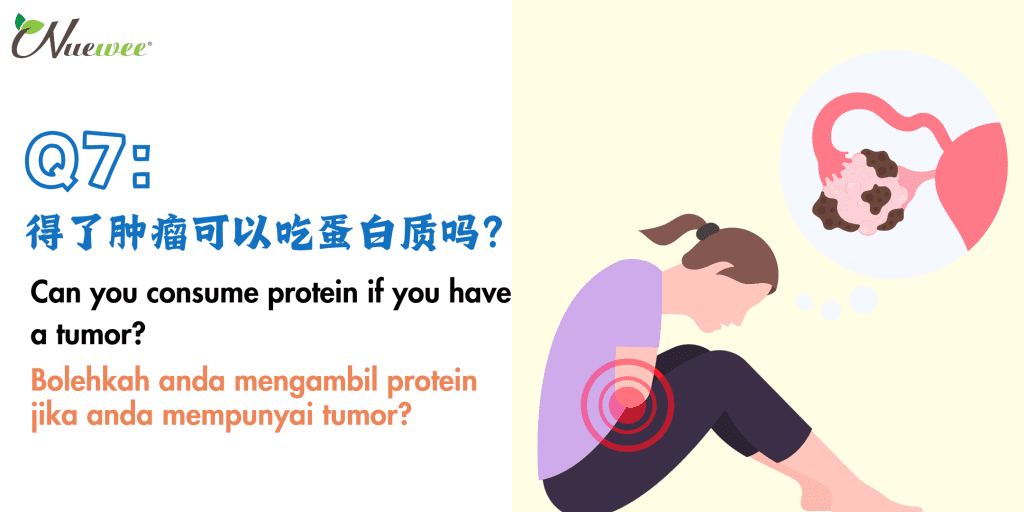
Q7 Can you consume protein if you have a tumor?
After getting a tumor, it’s appropriate to intake protein, but adjustments and management should be based on individual health conditions, treatment plans, and nutritional needs. Protein is crucial for tumor patients as it helps support tissue repair, immune function, and overall nutritional status.
For example, just like a car needing repairs, tumor treatment is like the repair process. Protein acts like providing the necessary parts and tools for repair, aiding the body in rebuilding healthy tissues. However, like repairing a car, using too many or unsuitable parts can cause issues.
Therefore, tumor patients should ideally follow a customized nutritional plan under the guidance of a doctor or nutritionist when consuming protein. This ensures support for treatment and recovery without adding extra burden to the body.
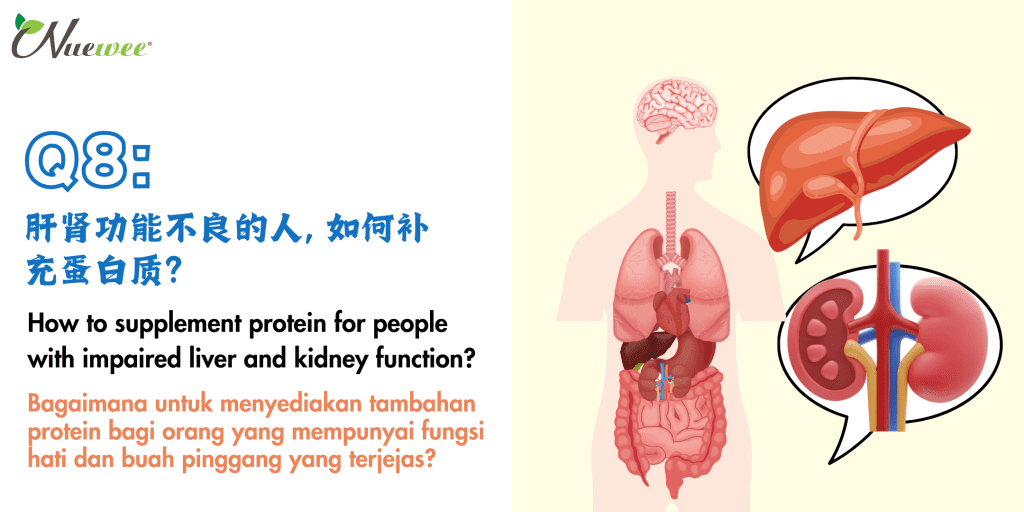
Q8 How to supplement protein for people with impaired liver and kidney function?
For patients with kidney disease, it’s generally necessary to control protein intake. The usual recommendation is to consume about 0.6 to 0.8 grams of protein per kilogram of body weight per day. Protein intake for patients with liver disease should also be adjusted based on their condition, typically advised to be around 1.0 to 1.2 grams of protein per kilogram of body weight per day.
Choosing high-quality protein:
- Protein with high biological value: Opt for sources with high biological value such as fish, poultry, eggs, and dairy products. These provide essential amino acids while reducing metabolic burden on the body.
- Plant-based protein: Plant sources like beans, nuts, and seeds are also good choices as they are rich in fiber and plant nutrients, beneficial for kidney health.
Balanced diet:
- Include other nutrients: Ensure your diet includes adequate carbohydrates and healthy fats to provide sufficient energy and reduce the breakdown of protein for energy.
- Reduce sodium and phosphorus: Patients with impaired kidney function should reduce intake of sodium and phosphorus to prevent edema and osteoporosis.
For patients with compromised liver and kidney function, it’s crucial to be cautious when supplementing protein, opting for high biological value sources and avoiding high-protein diets. Adjustments should be made based on individual circumstances and the stage of the disease. It’s advisable to plan protein intake under the guidance of doctors and nutritionists to ensure balanced nutrition and support normal body function and recovery.
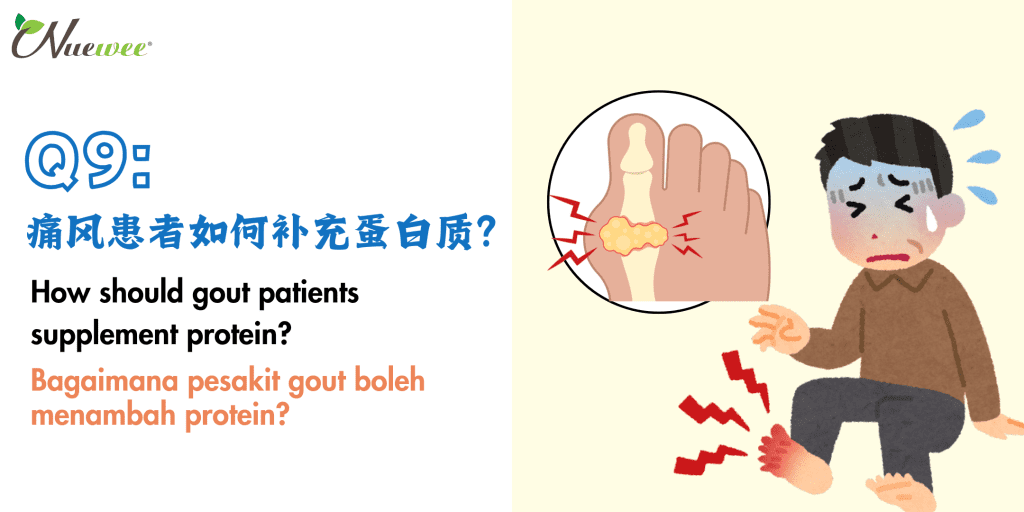
Q9 How should gout patients supplement protein?
For gout patients, the intake of purines in the diet requires special attention. Many gout patients are concerned about soy and its products, especially soy protein isolate, because they are high in protein.
Some studies suggest that soy protein may help lower or maintain normal uric acid levels without significantly increasing the risk of gout attacks. For instance, one study found that consuming soy protein did not significantly raise uric acid levels and might even provide some protective effects for gout patients.
Gout patients can actually consume soy protein isolate in moderation as a low-purine protein source. Soy protein isolate not only has a low purine content but is also rich in essential amino acids, making it a relatively safe and nutritious choice. However, it is still important to maintain overall dietary balance and regularly monitor uric acid levels to ensure the diet helps manage gout effectively.
The daily intake can be adjusted based on individual protein needs and total purine intake, but generally, it is appropriate to consume no more than 30 grams per meal.
Additionally, drinking plenty of water is very important. Drinking 2 to 3 liters of water daily helps promote uric acid excretion and reduces the risk of gout attacks. Therefore, drinking more water regularly will be very helpful in managing gout.
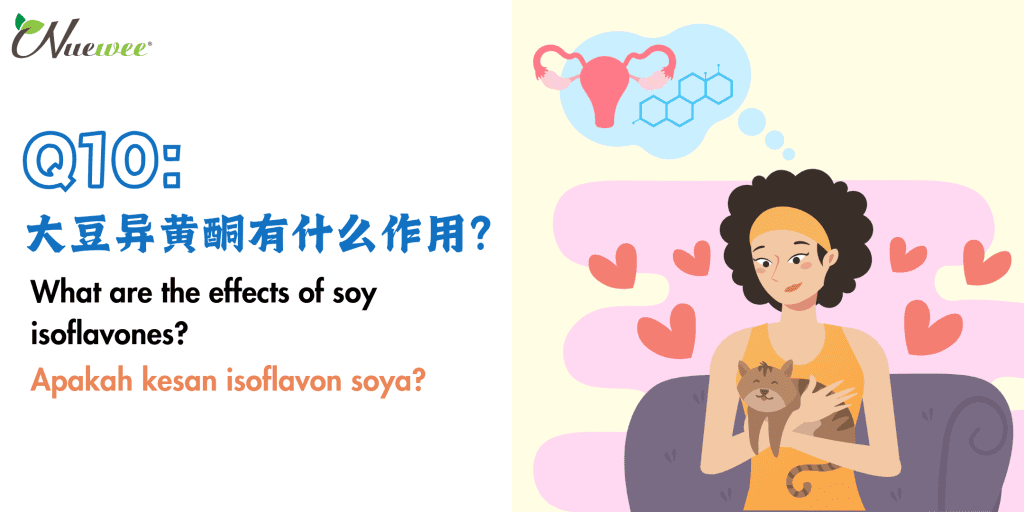
Q10 What are the effects of soy isoflavones?
Soy isoflavones are plant compounds found in soybeans and soy products, classified under flavonoids. They are represented by genistein, daidzein, and glycitein, and are referred to as phytoestrogens due to their structural similarity to estrogen. These compounds exhibit various biological activities beneficial to health and disease prevention. Here are their primary functions and scientific basis:
- Promoting Women’s Health: Helps alleviate menopausal symptoms and regulate the menstrual cycle.
- Cardiovascular Protection: Can lower cholesterol levels and possess antioxidant properties.
- Anti-Cancer Effects: Assists in the prevention of breast cancer and prostate cancer.
- Promoting Metabolic Health: Improves insulin sensitivity and helps in weight control.
- Anti-Inflammatory and Immunomodulatory: Exhibits anti-inflammatory properties and can enhance immune function.
- Improving Skin Health: Has anti-aging effects and can prevent UV damage.
- Protecting Bone Health: Helps reduce bone loss and increase bone density.
While soy isoflavones offer many health benefits, they should be consumed in moderation to avoid potential side effects from excessive intake. It is recommended to consume them under the guidance of a doctor or nutritionist to maximize their health benefits.
For more information:
1. Nuewee Organic Green Tea Protein with Stem Cell Gold
2. Nuewee Organic Blackcurrant Protein with Astaxanthin
3. Nuewee Organic Banana Protein with Tiger Milk Mushroom
4. Nuewee Organic Pumpkin Seed Protein with Turmeric
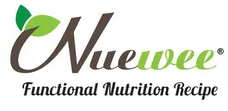

Your point of view caught my eye and was very interesting. Thanks. I have a question for you.
Can you be more specific about the content of your article? After reading it, I still have some doubts. Hope you can help me.
Your article helped me a lot, is there any more related content? Thanks!
Can you be more specific about the content of your article? After reading it, I still have some doubts. Hope you can help me.
Thanks for sharing. I read many of your blog posts, cool, your blog is very good.
https://888-de.com
Hi there to all, how is the whole thing, I think every one is getting more from this web site, and
your views are pleasant in support of new people.
https://betathome-de.com
Hello mates, its wonderful piece of writing regarding cultureand completely explained, keep it up all the time.
coral
Thanks for the marvelous posting! I seriously enjoyed
reading it, you happen to be a great author. I will make sure to bookmark your blog and definitely will come back at some point.
I want to encourage that you continue your great work, have a nice holiday weekend!
anonym
I’m really enjoying the theme/design of your blog. Do you
ever run into any internet browser compatibility problems?
A few of my blog audience have complained about my website not
operating correctly in Explorer but looks great in Opera.
Do you have any solutions to help fix this problem?
rembrandt
What’s up, after reading this amazing post i am as well happy to share my know-how here with friends.
slotspalace
Saved as a favorite, I like your website!
quickwin
I’m amazed, I have to admit. Rarely do I come across a blog that’s both equally educative and interesting, and without
a doubt, you’ve hit the nail on the head. The problem is an issue
that not enough men and women are speaking intelligently about.
Now i’m very happy that I came across this in my search for something concerning this.
https://amunra-de88.com
It’s very effortless to find out any matter on net as compared to books, as I found this
paragraph at this website.
casinoly
Every weekend i used to go to see this web site, because
i wish for enjoyment, for the reason that this this website conations really good funny data too.
https://20bet-de88.com
It’s amazing for me to have a website, which
is helpful in favor of my experience. thanks admin
ggbet
You need to take part in a contest for one of the greatest blogs on the internet.
I will recommend this blog!
https://darkorbit-de.com
My brother recommended I might like this blog. He used to be
totally right. This publish truly made my day.
You cann’t consider simply how a lot time I had spent for this info!
Thank you!
https://Semen-Padang-FC.com
This is very attention-grabbing, You are an excessively skilled blogger.
I’ve joined your rss feed and stay up for searching for more
of your wonderful post. Additionally, I have
shared your web site in my social networks
daddy
What’s up to all, the contents existing at this web site are truly awesome for people experience, well, keep up the
nice work fellows.
https://bola88-live-id.com
I’ve been surfing online greater than 3 hours today, but I never found any attention-grabbing article like yours.
It’s beautiful worth enough for me. In my view, if all website owners and
bloggers made good content material as you
did, the web will likely be a lot more helpful than ever before.
Persita Tangerang
I know this if off topic but I’m looking into starting my own weblog and was
curious what all is required to get setup? I’m assuming having a blog like yours would cost a pretty penny?
I’m not very internet smart so I’m not 100% certain. Any suggestions or advice would be greatly appreciated.
Appreciate it
Borneo FC Samarinda
Hi there to every one, for the reason that
I am really eager of reading this webpage’s post to be updated regularly.
It consists of good data.
https://Malut-United-FC.com
What’s Taking place i’m new to this, I stumbled upon this I’ve discovered It positively helpful and it has aided
me out loads. I am hoping to contribute & help other customers like its aided me.
Great job.
https://iribet-88.com
mГ©dicament contre le paludisme sans ordonnance: prix atovaquone proguanil – fosfomycine sans ordonnance pharmacie
Can you be more specific about the content of your article? After reading it, I still have some doubts. Hope you can help me.
Hey very interesting blog!
supremo
Having read this I thought it was rather informative.
I appreciate you taking the time and effort to put this article together.
I once again find myself spending a lot of time both reading and leaving comments.
But so what, it was still worth it!
betleao
This piece of writing is truly a fastidious one it helps new web viewers, who
are wishing in favor of blogging.
winzada 777
apotek i danmark: berberine apotek – plaster apotek
http://zorgpakket.com/# pillen bestellen
Nice post. I was checking continuously this blog and I’m inspired!
Very helpful info specially the last section 🙂 I deal with
such information much. I used to be seeking this certain information for a very lengthy
time. Thanks and good luck.
bet7
Thank you for some other wonderful article. Where else may anyone get that type of
information in such an ideal method of writing?
I have a presentation next week, and I’m at the look for such information.
https://betanocasino-br.com
obviously like your web site but you have to take a look at the spelling on quite a few
of your posts. A number of them are rife with spelling problems and I to find it
very bothersome to tell the reality nevertheless I
will certainly come again again.
pixbet
treg mage apotek: TryggMed – l-serin pГҐ apotek
glutathione apotek magnesiumsulfat apotek flГҐttfjerner apotek
hur stavas schampo: Snabb Apoteket – tandskena apotek
https://tryggmed.shop/# stiv såle apotek
https://zorgpakket.com/# medicine online
Woah! I’m really loving the template/theme of this website.
It’s simple, yet effective. A lot of times it’s very hard to get that “perfect balance” between user friendliness and
visual appeal. I must say that you’ve done a awesome job with this.
Additionally, the blog loads super fast for me on Chrome. Exceptional Blog!
https://novibet-br.com
Post writing is also a fun, if you be familiar
with afterward you can write if not it is complex to write.
https://moverbet-brasil.com
Greetings! Quick question that’s completely off topic.
Do you know how to make your site mobile friendly?
My weblog looks weird when viewing from my iphone. I’m
trying to find a theme or plugin that might be able to
resolve this problem. If you have any recommendations, please share.
Thank you!
dobrowin
fotvГҐrd apotek: apotek acne – apotek Г¶gondroppar
WOW just what I was searching for. Came here by
searching for seo
dobrowin
Generally I don’t learn post on blogs, however I would
like to say that this write-up very pressured me to check out and do
it! Your writing style has been surprised me. Thanks, very great post.
lvbet
medicijn bestellen: Medicijn Punt – medicatie apotheek
http://zorgpakket.com/# medicijn recept
apotheek online bestellen beste online apotheek medicine online
An outstanding share! I have just forwarded this onto a
coworker who was conducting a little research on this.
And he in fact bought me dinner simply because I found it for him…
lol. So let me reword this…. Thanks for the meal!!
But yeah, thanx for spending the time to talk about this topic here on your internet site.
betleao
Thanks for sharing. I read many of your blog posts, cool, your blog is very good.
Yes! Finally something about seo.
doce
apotek vulkan: flex apotek – klamydia test apotek
https://snabbapoteket.shop/# mäta kolesterol apotek
rosa munnbind apotek: ГёlgjГ¦r apotek – ansiktsmaske apotek
medicijnen zonder recept [url=http://zorgpakket.com/#]MedicijnPunt[/url] mijn medicijn bestellen
https://snabbapoteket.com/# apotek hemleverans samma dag
http://tryggmed.com/# reseptfri sovemedisin apotek
nagelsvamp apotek: hur mycket kostar kondomer – apotek Г¶ppet midsommardagen